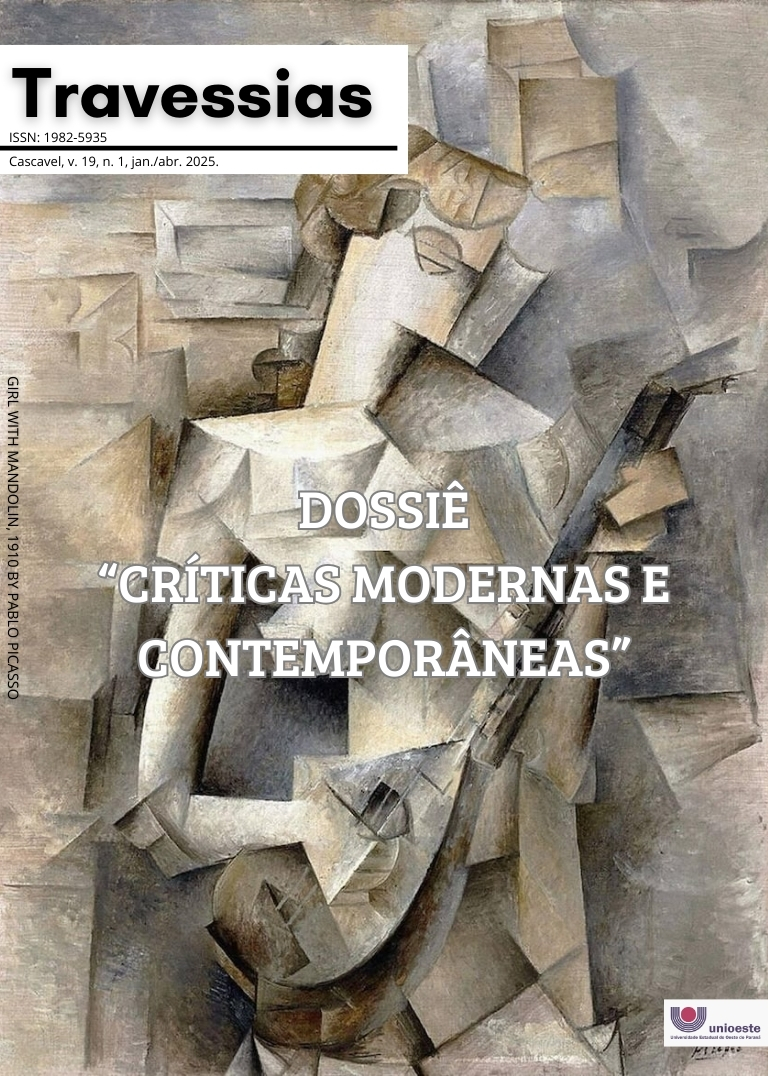Thinking about decoloniality, from the point of view of the colonizer's daughter, in the “Notebook of colonial memories”, by Isabela Figueiredo
other bias
DOI:
https://doi.org/10.48075/rt.v19i1.35068Keywords:
Colonial memories, Decoloniality, Process of domination, ObjetictificationAbstract
The work Notebook of colonial memories (2019), by Mozambican author Isabela Figueiredo, the subject of this study is a dense autobiographical text that presents a certain duality, on the part of the author, in relation to the process of colonization of the Portuguese colonies and the notion of decoloniality on which current authors have emphasized and have raised different approaches. We present this discussion, based on Adichie (2009); Lejeune (2009); Lerner (2019); Stevens (2014); Mignolo (2017); De Marco (2024) and Bento (2022), and we weave an approach from the perspective of Isabela Figueiredo's autobiographical authorial voice which presents, from two distinct phases of her life (in Mozambique and in Portugal), her vision of the process of domination imposed by slave owners, as well as the objectification of black subjects, especially women, and the naturalness with which Europeans established themselves as superior to them. It is a narrative that sometimes has traces of decoloniality, and sometimes, influenced by her father's Eurocentric concepts, the author tends to defend his attitudes, raising doubts about her ideological positioning. Our objective is to foster discussions about the unique bias of the History of the enslaved African people, shown from the colonizer's point of view, and to present the side of the oppressed, the subjugated, the objectified, whose labor force provided well-being and social prestige to the executioner.
Downloads
References
ADICHIE, Chimamanda Gnozi. O perigo de uma história única. Tradução: Júlia Romeu, 1 ed. - São Paulo, Companhia das Letras: 2009.
BENTO, Cida. Pacto da Branquitude. São Paulo: Companhia das Letras, 2022.
DE MARCO, Valéria. A literatura de testemunho e a violência de Estado. Lua Nova, n. 62, p. 45-68, 2004. Disponível em: http://www.scielo.br/pdf/ln/n62/a04n62.pdf. Acesso em: 15 out. 2024.
LEJEUNE, Philippe. O pacto autobiográfico: de Rousseau à internet. Organização de Jovita Maria Guerheim Noronha e tradução de Jovita Maria Guerheim Noronha e Maria Inês Coimbra Guedes. Editora UGMG – Belo Horizonte, 2009.
LERNER, Gerda. A criação do patriarcado: história da opressão das mulheres pelos homens. Tradução Luiza Sellera. São Paulo: Cultrix, 2019.
MIGNOLO, Walter D. Colonialidade: O lado mais escuro da modernidade. Tradução de Marco Oliveira. Duke University, Durham, NC, EUA. – Pontifícia Universidade Católica do Rio de Janeiro (PUC-Rio), Rio de Janeiro – RJ, Brasil. DOI 10.17666/329402/2017.
SEGATTO, Bruno Félix. O que foi a Revolução dos Cravos de 1974? – Politize! – Publicado em 12/06/2024. Disponível em: https://www.politize.com.br/revolucao-dos-cravos/. Acesso em 17 dez. 2024.
STEVENS, Cristina; OLIVEIRA, Susane Rodrigues de; ZANELLO, Valeska (org.). Estudos feministas e de gênero: articulações e perspectivas. Editora Mulheres, 2014.
Downloads
Published
How to Cite
Issue
Section
License
Copyright (c) 2025 Authors keep the copyright and grant the journal the right of first publication, with the work simultaneously licensed under the Creative Commons Attribution License (CC-BY-NC-SA 4.0), which allows sharing the trial with acknowledgment of authorship and initial publication in this journal.

This work is licensed under a Creative Commons Attribution-NonCommercial-ShareAlike 4.0 International License.
Creative Copyright Notice
Policy for Free Access Journals
Authors who publish in this journal agree to the following terms:
1. Authors keep the copyright and grant the journal the right of first publication, with the work simultaneously licensed under the Creative Commons Attribution License, which allows sharing the trial with acknowledgment of authorship and initial publication in this journal.
2. Authors are authorized to take additional contracts separately, for non-exclusive distribution of the work version, published in this journal (eg publish in institutional repository or as a book chapter), with acknowledgment of authorship and initial publication in this journal.
3. Authors are allowed and encouraged to publish and distribute their work online (eg in institutional repositories or on their personal page) at any point before or during the editorial process, as this can generate productive changes, as well as increase both impact and citation of the published trial (See The Effect of Free Access).
Creative Commons License
This work is licensed under a Creative Commons Attribution–NonCommercial-shareaswell 4.0 International License, which allows you to share, copy, distribute, display, reproduce, completely or part of the work, since there is no commercial purpose, and authors and source are cited.



